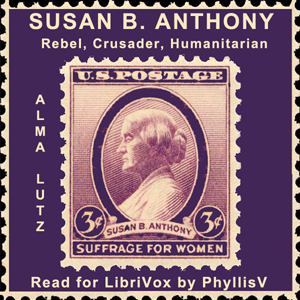Mae Watkins, a University of Michigan student, unexpectedly falls in love with a Chinese international law student in the midst of World War I. Despite the socially unacceptable pairing the couple decide to tie the knot and forge ahead with an unsure future. Mae demonstrates her unique ability to observe and describe a foreign culture after their move to Shanghai. She documents in detail her perceptions of Chinese fashion and food in addition to her knowledge of such controversial customs as foot binding and widow suicide. She offers great compassion for her Chinese family, both current and past. This book was ghost written by Katherine Anne Porter and published in Asia in serialized form in 1920. The original manuscript has been lost, but the serial form was subsequently republished. - Summary by Danielle Cartwright
4 episodes
Louise Creighton (1850-1936) was a British author and women's rights activist. The wife of the Anglican bishop of London, she was the mother of seven children. In this short book, Creighton gives us chapters on such well-known women as Joan of Arc, Florence Nightingale, and Queen Victoria. But we also learn about St. Hilda, the 7th century royal princess who became an influential abbess, the prison reformer, Elizabeth Fry, and Isabella Bird, who thrilled Victorian readers with accounts of her lone travels on horseback to remote and perilous places. - Summary by Pamela Nagami, M.D.
17 episodes
A biography of the early feminist writer Margaret Fuller, a groundbreaking journalist and author of Woman in the Nineteenth Century, and one of America's first prominent feminists. The author is Julia Ward Howe, best known for writing "The Battle Hymn of the Republic," as well as numerous other works of prose and poetry, and a leader of the suffragist movement. - Summary by Ciufi Galeazzi
17 episodes
As one of the first two bishops of the Methodist church in America and one of the most well-known circuit riders during the spread of Methodism, Francis Asbury kept a journal of his travels and activities. His journal begins with his prayerful decision to come to America in 1771 and continues to December of 1815, a few months before his death. In the meantime, we travel with Rev. Asbury across the ocean, over mountains, through rivers, and up and down the whole length of the fledgling United States of America. Summary by Devorah Allen
49 episodes
William Booth, together with his wife Catherine founded a small mission in London which eventually expanded to become a global movement, carrying the Christian gospel message of salvation and holiness under the banner of the Salvation Army. While never losing his sharp focus on personal transformation that saved men and women from the depths of despair, Booth put faith into action by caring for the temporal needs of society wherever the Army gained a foothold. George Scott Railton was the first Commissioner in the Salvation Army and second in command, working closely and intimately with Booth, and traveling extensively around the world. He presents here a comprehensive biography of the man who changed history; Included are many tributes to the General after his death, and further chapters on the spirit of the Army and its work. - Summary by Larry Wilson
38 episodes
If it be true that it takes a great man to interpret the life of a great man then Bushrod Washington made no mistake in the selection of a biographer. For Marshall, under the influence of Washington, came to be nearly as great a man as the character whose life and achievement held his deepest thought for nearly a quarter of a century. . . . Marshall's sympathetic understanding of his subject, his firsthand knowledge of events with his remarkable powers of expression qualified him to produce the masterpiece that has come down to us.
17 episodes
From time immemorial, women have served as wives, mothers and domestic organizers. But in the nineteenth century, the lives of women were changing, allowing those with drive to serve in other capacities. In this volume, we briefly examine the lives of eleven such women, ranging from 'Our Lady of the Red Cross', Clara Barton to 'A Champion of the Cause', Anna Howard Shaw and 'The White Mother of Darkest Africa', Mary Slessor. - Summary by Lynne Thompson
12 episodes
This short biography of Martin Luther, by Gustav Just, who taught at Bethlehem Evangelical Lutheran School, St. Louis, is a standard resource for students, young and old. The first five chapters give a swift moving, succinct overview of church history up to Luther’s time, and the final two chapters deal with the church after Luther’s death. Martin Luther is presented in a favorable, but objective light and his influence appreciated as the primary leader of the Reformation. - Summary by Larry Wilson
20 episodes
Mahommah Gardo Baquaqua was a former slave, native of West Africa. He was sold as a slave in 1845 and worked in Brazil as a captive; however, when the ship where he was enslaved crew was at the harbor in New York in 1847, he fled. He studied at the New York Central College in McGrawville for almost three years. In 1854, he moved to Canada; he narrated his autobiography to the abolitionist Samuel Downing Moore in Detroit, who published it. His narrative is the only known document about the slave trade written by a former Brazilian slave. - Summary by Leni
9 episodes
Charles James Fox (1749-1806) was a prominent British Whig member of Parliament and the arch-rival of William Pitt the Younger. A staunch opponent of George III, he supported the American colonists throughout the War of Independence. He was a leading parliamentary advocate of religious tolerance, individual liberty, and the anti-slavery cause. A notorious gambler and womanizer, Fox fell in love with and married Elizabeth Armistead, the former mistress of the Prince of Wales, and found happiness and tranquility in their home, St. Anne's Hill. He was most famous for his oratory, of which Wakeman writes that in "the whole range of Fox's speeches there is not to be found a mean thought or an affectation...The very openness and complete absence of reserve, with which he poured out his whole heart to his audience took them by storm." (Pamela Nagami, M.D.)
21 episodes
The Real Oscar Wilde is the third book about the Irish poet and playwright by his earliest and most prolific biographer. Since writing his earlier The Life of Oscar Wilde (1906), Sherard had read Lord Alfred "Bosie" Douglas's Oscar Wilde and Myself (1914) and the unexpurgated manuscript of Wilde's De Profundis. - Summary by Rob Marland
27 episodes
Among all the numerous life stories written by Ferdinand Schmidt for the delectation and education of German youth, none surpasses that of Washington. The author has condensed his material, drawn from the most authoritative sources, in a masterly manner, and presents it in a very attractive form. He has accompanied it by moralization which is pertinent, but never becomes tedious. It is questionable, indeed, whether any story of Washington’s life written for young people excels Schmidt’s in accuracy, conciseness, and general interest. As such this sketch of the Father of his Country from a German point of view is commended to American youth. -- Translator's Preface - Summary by George P. Upton
19 episodes
John Churchill, 1st Duke of Marlborough (1650-1722), was the oldest surviving son of Sir Winston Churchill, an impoverished country gentleman. After the restoration of Charles II, John's sister, Arabella, became the mistress of the King's brother, James, Duke of York. The family fortunes were made and Churchill's military career launched. In the winter of 1677-78, Churchill married Sarah Jennings, the intimate friend of the future Queen Anne. Ruthlessly changing sides during the Glorious Revolution, he deserted his patron James and joined the army of William of Orange. Marlborough's brilliant generalship in the War of the Spanish Succession destroyed the myth of French military invincibility and won him the adoration of the British people. But Marlborough fell from power when his wife's relationship with Queen Anne ended rancorously and when the peace-loving Tories ousted his wartime supporters, the Whigs. - Summary by Pamela Nagami, M.D.
39 episodes
The author of this biography of Poe, Susan Weiss, describes her work as follows: "I have not treated Poe in his character of poet or author, but confined myself to his private home-life, domestic and social, as I have heard it described by Poe's most intimate friends who knew him from infancy—some of them my own relatives—and from my own brief knowledge of him in the last three months of his life." - Summary by Ciufi Galeazzi
32 episodes
Booker T. Washington was one of the first nationally recognized African American leaders after the Civil War. He was born to a slave woman in Virginia, who then took him as a young boy to West Virginia after the emancipation. Booker became a leader in education heading the Tuskegee Institute for more than 30 years and working with other universities. He advocated a moderate approach to elevating the African Americans through education and business, but worked behind the scenes to change discriminatory laws and practices, and became an adviser to the White House. He authored 14 books, and many articles and speeches, including his autobiography, Up from Slavery. - Summary by Larry Wilson
16 episodes
"In the year 1907, the Woman’s Home Companion commissioned me to go to Russia to write the story of the early days, courtship and marriage of her whom the world knows to-day as the 'Tsaritsa,' The following year, the same periodical sent me to Italy to write a similar account of the life of Queen Elena; and in 1910 I was once more sent abroad, this time to Spain, to learn all about Queen Victoria Eugenie....'Your task is difficult,'remarked a friend to whom I had just explained that I was writing the lives of the Empress of Russia, the Queen of Spain, and the Queen of Italy. 'Your task is difficult, because these are three good Queens, and good Queens, like all good women, have no history.' Now that I have told the stories of these three good Queens, I wonder if my friend will not grant that they have been worth the telling?" (from the Foreword)
31 episodes
Volume 2 of The Life begins with some early biography, but moves quickly to Washington's military career as a colonel in the battles against the French in Canada until the cessation of his tenure, after which he marries and appears to settle down. But, of course he is called to lead the troops fighting in the revolution against England about which leadership the remaining of Volume 2 is dedicated to the point of the American rejection of England's Plan for Reconciliation.
12 episodes

In this short book Edward Ellis Morris writes a vivid account of the reigns of the first two Georges. Scarcely had the fifty-four-year-old king assumed the throne when James Stuart roused the Highlanders in the "Fifteen." Five years later the collapse of the South Sea Company convulsed Britain and her first prime minister, Robert Walpole, emerged to stabilize the country's finances. George II succeeded his father in 1727 and Morris writes that "the new King was in person short, and like many short men, proud and touchy." Fortunately, he was guided by the wise Queen Caroline. On the Continent, the Turks besieged Vienna, Britain got embroiled first in the War of Jenkins' Ear and then in the War of the Austrian Succession, while Bonnie Prince Charlie took advantage of these distractions to mount the nearly successful Jacobite invasion of the "Forty-five." Meanwhile, John Wesley's Methodism revived religious enthusiasm, Boswell immortalized Samuel Johnson and his friends, and Tom Jones embarked on an epic road trip in which Henry Fielding brought English society to life, warts and all. - Summary by Pamela Nagami, M.D.
34 episodes
This history is the story of Cyrus, the founder of the Persian Empire, sixth century BC. - Summary by Deon Gines
12 episodes
This work relates the history of the Medici family through three centuries and eleven generations, from its rise from obscurity, to its zenith of power and influence, to its eventual decay and ruin. It outlines their history in conjunction with the major events of Europe and dwells much on the artists and artworks patronized by the Medici - the impetus of the Renaissance. This first volume brings to life the Renaissance and how Florence, through the Medici, was the epicentre of the movement that spread new learning throughout Europe. It describes some of the best and worst of the Medici, including statesmen both good and bad, popes and their intrigues, joyous festivals and tragic assassinations. (Summary by TriciaG)
43 episodes
This is a brief biography of the Scottish physician and suffragist Dr. Elsie Inglis. Dr. Inglis founded a maternity hospital for the poor in Edinburgh (then known as the Hospice, but later as the Elsie Inglis Memorial Hospital), and was known for her charity and willingness to waive fees when patients could not afford her care. She was also a key figure in Scotland's Women's Suffrage Movement. She is best known, however, for founding the Scottish Women's Hospitals for Foreign Service, which provided staffed teams of female-staffed field hospitals to war zones during World War I. - Summary by Ciufi Galeazzi
14 episodes
This history covers the years of Xerxes' years as ruler of the Persian empire and invasion of Greece. - Summary by Deon Gines
12 episodes
Alma Lutz's outstanding biography of Susan B. Anthony is revered for its descriptive power, attention to detail and historical significance to the women's Suffragette movement. - Summary by PhyllisV
26 episodes
Nero tells the life story of one of the most infamous of Roman Emperors. - Summary by Deon Gines
13 episodes
Бесконечно преданный русской литературе, Юлий Айхенвальд видел писателя как уникальную личность и не признавал литературных школ и течений. Oн погиб в Париже возвращаясь ночью от Набоковых погруженный в мысли о литературе, и попал под трамвай.
Эти очерки рассматривают только творчество, они не касаются биографических событий. Второй выпуск посвящен русским писателям XIX—XX вв. Некоторые очерки будут озвучены в следующем выпуске Силуэтов в более поздней редакции.
A connoisseur of the Russian literature, Yuly Eichenwald wrote about writers as unique persons, and not as members of schools and movements. His Silhouettes of Russian Writers are about their oeuvre, not biographies. - Summary by Mark Chulsky
22 episodes
Sentenced to house arrest for forty-two days owing to his participation in a duel, Xavier de Maistre was inspired to write a travel memoir about the greatest journey a man can take. It is a journey which costs nothing, one which is equally well-suited to the "miserly or prodigal, rich or poor, young or old" -- even the idlest man will enjoy this "pleasure jaunt which will cost him neither time nor money." Come then: join Maistre in a journey round his room. - Summary by Steven Watson
14 episodes
This work relates the history of the Medici family through three centuries and eleven generations, from its rise from obscurity, to its zenith of power and influence, to its eventual decay and ruin. It outlines their history in conjunction with the major events of Europe and dwells much on the artists and artworks patronized by the Medici - the impetus of the Renaissance. This second volume begins in 1537 and highlights Catherine, the last of the elder branch, then follows the younger branch to the eventual extinction of the family in 1743. - Summary by TriciaG
47 episodes
This history concerns Pyrrhus, king of Epirus, BC 336-321. Pyrrhus was a world renowned soldier, leader, and conqueror of Macedon and Italy, from whom the term Pyrrhic victory was taken. - Summary by Deon Gines
12 episodes
Jerry McAuley was a missionary and founder of the Water Street Mission (later the New York City Rescue Mission), the first rescue mission in the United States. This book is a collection of his writings regarding his waywardness, his conversion and his missional work in New York both at the Water Street Mission and later at the Cremorne Mission. (Summary by KHand)
21 episodes
Margaret Sanger, an advocate for birth control rights, chronicles the story of her struggles, including her times in jail and in exile, in order to legalize birth control options for women. She details the uphill battles of not only convincing lawmakers, but of doctors as well. Her relentless pursuit is told against the backdrop of courtrooms, her personal life, and her travels across the globe, giving a glimpse into the world during and post-WW I.
This riveting account is a must read for those interested in a key moment in woman’s history and reform. (Summary by PhyllisV)
49 episodes
This short history by the eminent British historian, Mandell Creighton, places Elizabeth and her reign within the context of 16th century European political, religious, and military events. Elizabeth overcomes her two great rivals, King Philip of Spain and Mary, Queen of Scots. England gradually unites behind her Queen, who survives multiple assassination plots. After the defeat of the Spanish Armada, the English, lightly taxed by their frugal sovereign, launch flourishing commerce enterprises. The author writes of the Protestant Reformation that "a change of belief meant a revolt from authority." In this age of individualism, personal daring, and a consciousness of national greatness, the golden age of Elizabethan literature breaks new ground in historiography, literary theory, poetry, and above all, drama. (Pamela Nagami, M.D.)
25 episodes
Holland 's provides us with an engaging history of the Unification ("Risorgimento") of Italy by exploring the lives of some of its most important figures: Alfieri, Manzoni, Gioberti, Manin, Mazzini, Cavour, Garibaldi, and Victor Emmanuel. - Summary by Ciufi Galeazzi
17 episodes

The Ordeal of Mark Twain analyzes the literary progression of Samuel L. Clemens and attributes shortcomings to Clemens' mother and wife. The Encyclopaedia Britannica says, Brooks' work "was a psychological study attempting to show that Twain had crippled himself emotionally and curtailed his genius by repressing his natural artistic bent for the sake of his Calvinist upbringing." Also, Brooks says, his literary spirit was sidelined as "...Mark Twain was inducted (with the success of 'Innocents Abroad') into the Gilded Age, launched, in defiance of that instinct which only for a few years was to allow him inner peace, upon the vast welter of a society blind like himself, like him committed to the pursuit of worldly success." And, still more disturbingly, Brooks maintains... "We shall see that in the end, never having been able to develop, to express itself, to fulfill itself, to air itself in the sun and the wind of the world, it turned as it were black and malignant, like some monstrous, morbid inner growth, poisoning Mark Twain's whole spiritual system. We have now to note its constant blind efforts to break through the censorship that had been imposed on it, to cross the threshold of the unconscious and play its part in the conscious life of this man whose will was always enlisted against it." The implication of all this begs the question, "What might a truly unleashed Mark Twain have produced?" For a recording of a New York Times review of this book, go this link: Review ( John Greenman & Wikipedia)
11 episodes
A biography of a woman who advocated for the humane treatment of people with mental illness. As a young woman travelling overseas, Dorothea Dix met with people who were interested in reforming how the mentally ill were treated. Returning to America, she pushed for changes and proper care for these individuals, meeting with strong resistance. Her work ultimately resulted in social reform and the creation of asylums. Dorothea Dix was a tireless crusader and instrumental in important social reforms in the United States and the world. - Summary by Phyllis Vincelli
33 episodes

































